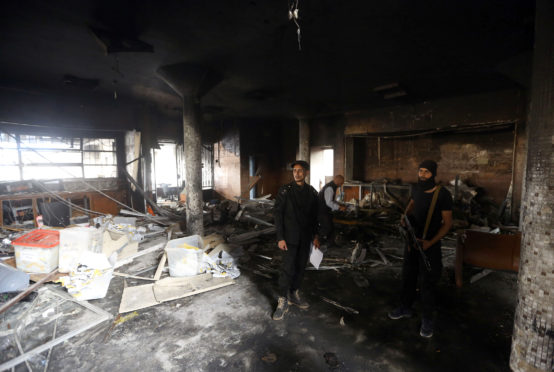
FBI investigators probing the Lockerbie bombing have been pulled out of Libya because of escalating conflict.
US agents tasked with finding out who assisted bomber Abdelbaset al-Megrahi have been withdrawn from the fractured country in north Africa.
Families of those who died when Pan Am Flight 103 was blown up in December 1988 were told last week in a letter from the FBI.
However, John Mosey, whose 19-year-old daughter Helga was on the London to New York flight, said: “I think it’s an excuse to say that they’ve found nothing in Libya.”
Many families of those who died believe Megrahi, who was freed from jail because of a terminal illness almost 10 years ago, was not responsible for the terrorist attack that killed all 259 people on the plane and 11 people in Lockerbie.
Mr Mosey said: “Having attended the whole of the trial except for two weeks, we were far from convinced of his guilt.
“When he was released I felt that something a bit closer to justice was being done.”
The FBI continued to pursue Megrahi’s co-conspirators until April, when fighting escalated between forces of the internationally recognised Government of National Accord and political faction the Libyan National Army.
In a letter, Kathryn Turman, the FBI’s Victim Services Division assistant director, told families: “This has created an even greater environment of destabilisation within Libya. It is unknown when the fighting will resolve and which group will take over leadership.
“Due to the current situation, the US government has ceased all movement into Libya and withdrew the limited personnel previously in country.
“Of course, the FBI will continue to work with other investigative leads, including those with our Scottish partners, to focus on efforts outside of Libya, and within Libya when opportunities arise.”
Former police officer Iain Mckie, secretary of the Justice for Megrahi group, which campaigns to clear his name, questioned the decision to pull out of Libya. He pointed to the extradition of the brother of Manchester Arena bomber Salman Abedi last week and said it would appear the UK authorities can still “do business” in Libya.
Mr McKie said: “Where does the Crown Office stand on this given their inquiries are apparently ongoing In Libya?”
Prosecutors in Scotland are working with the FBI to bring those who assisted Megrahi to justice.
The Crown Office said: “Prosecutors and police, working with UK Government and US colleagues, will continue to pursue this investigation, with the sole aim of bringing those who acted along with Al Megrahi to justice. This is a live criminal investigation.”
It emerged in March that Scots investigators were interviewing at least five former agents of the East German secret police over their possible involvement in the Lockerbie attack.
Megrahi, a former Libyan intelligence officer, was convicted of the bombing in 2001 and sentenced to 27 years.
But the Scottish Government released him on “compassionate grounds” in 2009 and he died of prostate cancer, aged 60, three years later. The tenth anniversary of his release is on August 20.
Armed conflict in and around Tripoli escalated on April 4, 2019, when forces from the self-proclaimed Libyan National Army, led by General Khalifa Haftar, launched an offensive to capture the city from the Government of National Accord.
Civilians and medical workers are among dozens who have died, and a further 100,000 have fled Tripoli.
Both the US and the UK Government has warned citizens not to travel to Libya and those who are in the country have been told to flee.
The Foreign Office said: “Fighting can break out anywhere without warning.
“There’s a high risk of civilians being caught in indiscriminate gunfire or shelling, including air strikes, in all areas where there is fighting.”
The US State Department warned: “Do not travel to Libya due to crime, terrorism, civil unrest, kidnapping, and armed conflict.”

Enjoy the convenience of having The Sunday Post delivered as a digital ePaper straight to your smartphone, tablet or computer.
Subscribe for only £5.49 a month and enjoy all the benefits of the printed paper as a digital replica.
Subscribe